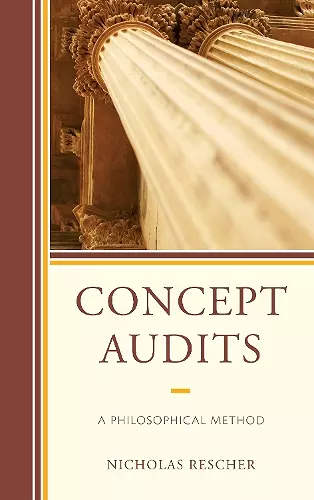Concept Audits
A Philosophical Method
Format:Paperback
Publisher:Bloomsbury Publishing PLC
Published:15th Sep '18
Currently unavailable, and unfortunately no date known when it will be back

Concept auditing is based on an innovative premise for philosophers: when they address an everyday life conception on the order of knowledge, truth, justice, fairness, beauty, or the like and purport to be dealing with what it involves, then they must honor the existing meanings of these terms. And insofar as the prevailing meaning is being contravened, they must explain how and justify why this is being done. They must, in sum, explain how their treatment of a topic relates to our established pre-systematic understanding of the issues involved and relate their deliberations to the prevailing conception of the matter they are proposing to discuss. The aim of a concept audit is to consider to what extent a given philosophical discussion honors this communicative obligation.
Concept Audits sets out not only to explain and defend this procedure, but also to consider a host of applications and exemplifications of these ideas. Nicholas Rescher shows how this method of conceptual auditing can function to elucidate and evaluate philosophical theses and doctrine across a wide spectrum of issues, ranging from logic to ethics and metaphysics. Accordingly, he explains and illustrates an instructive innovation in philosophical method. This new study of philosophical methodology presents its method in a clear and convincing way and shows the method at work with respect to a wide spectrum of important philosophical issues.
In Concept Audits, Rescher (Univ. of Pittsburgh) turns his attention to ordinary language, advocating for a simple method for ensuring that philosophical concepts such as “truth,” “knowledge,” and “beauty” hew to their pre-philosophical meanings. Echoing Ludwig Wittgenstein, Rescher makes the case that when philosophy moves away from ordinary language, philosophy suffers, not merely in its ability to solve conceptual problems but also in its ability to resonate with non-philosophers. Rescher’s method—to examine the ordinary-language terms used in philosophical deliberation—takes just ten pages to elaborate; in the 36 brief chapters that follow, he demonstrates concept auditing in practice. Rescher subjects classic problems, among them the Cartesian demon and the ship of Theseus, to conceptual audit, turning up all manner of equivocations, category mistakes, and logical fallacies... [H]e is a titan of the field, and Concept Audits offers a methodologically sound glimpse into contemporary ordinary language philosophy in action. Summing Up:Recommended. Lower-division undergraduates through faculty. * Choice Reviews *
[T]here are things to be gained by reading his book. * Notre Dame Philosophical Reviews *
As one of the world's strongest philosophers, Nicholas Rescher has written books on topics going far beyond analysis of Ordinary Language. In Concept Audits, however, his theme is how disastrous it is to forget what words ordinarily mean, using a host of intriguing examples. -- John Leslie, Fellow of the Royal Society of Canada
Nicholas Rescher’s admirable Concept Audits: A Philosophical Method systematizes a three-step natural language strategy for auditing the pretheoretical meanings of concept terms vital to philosophical expression. Rescher reveals the method successfully applied in many chapters in the history of philosophy, starting with Socrates’ elenchus as a prototype concept audit. He then considers the method’s value thematically in approaching a wide range of contemporary philosophical inquiries. Rescher’s book is highly recommended to students and professionals. It will be appreciated as much for what it teaches about the underlying assumptions of some of the past most productive practice of philosophy, as for its clearly articulated and lavishly illustrated program for charting future methodologically self-conscious philosophical advances. -- Dale Jacquette, Universität Bern
Nicholas Rescher successively shows that Ordinary Language Philosophy is viable today by applying its methodology to a wide variety of philosophical issues within logic and metaphysics and areas in between. I highly recommend the book for anyone who recognizes the important role language plays in philosophical methodology. -- Mark Roberts, Franciscan University of Steubenville
ISBN: 9781498540414
Dimensions: 221mm x 151mm x 15mm
Weight: 295g
194 pages